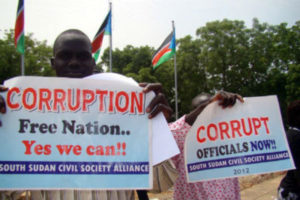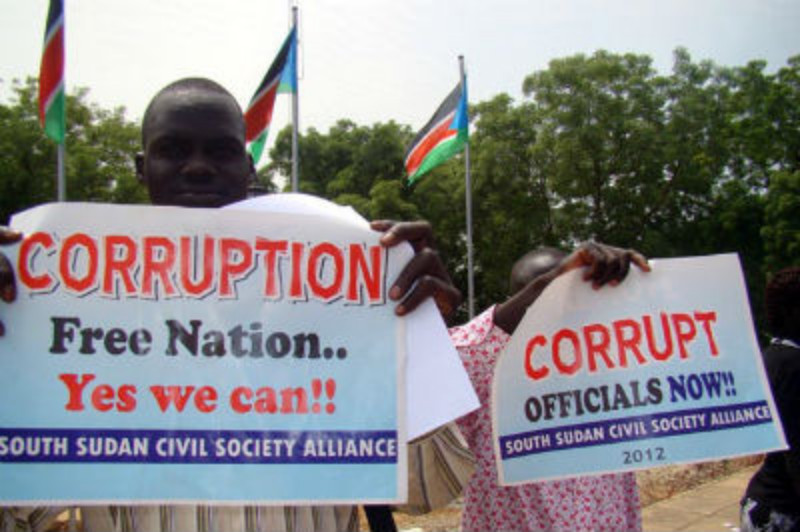
By: Bol Khan
Introduction
May 1, 2020 (SSNA) — Whys is DEMOCRACY not growing in most developing countries? In our view, Democracy is not growing in developing countries because of the following: 1) Majority of the leaders who have been in power are too undemocratic; 2) The politics play therein is always more of personalities (tribal) and not ideological one, and 3)Most of the leaders in power are at materials-related-war (animosity) against Civil Society and Human Rights Activists. In other words, Democracy does not survive in countries where Civil Society and Rights Activists are not allowed to exercise their constitutional roles; where constitutional terms limit are not applied or where institutions have not been strengthened. Democracy occurs when the State (country) institutions/constitutions are purposely made strong or strengthened to control the leaders or fight corruption. What are the roles that Civil Society can play in strengthening Democracy? Can Civil Society be an enemy of the people (leaders) in power? What are the two inseparable partners in a democratic nation’s building? Before we answer these three (3) questions, let’s first define the terms “Civil Society”. What’s Civil Society? Civil Society is (in a broader term) is an entire range of both organized or unorganized (non-political or unarmed) members of citizens in any country there are independent of the State; the law-abiding, tolerant, pluralistic, voluntary, and at least to some extent self-generating and self-reliance citizens. These groups, of course, including Non-Governmental Organizations (NGOs), independent mass media, think tanks, academia, universities, social associations, all independent citizens, and sometimes religious groups.
However, all members of these groups must have respect for the law, the individuals’ rights, and the rights of other groups to express their interests and opinions. As a civil society group or member, you don’t need to allow or value only what you as a person or the people of your own interest can express. The word “Civil” implies tolerance, accommodation of pluralism, and diversity. Civil societies may establish ties to political parties, or the leaders in power and the State but they must retain their independence and they do not seek political power for themselves. Civil Society is necessary to partner with the political and entire leadership of any country (State). Visionary leaders and must work to ensure that civil society is involved in a national democratic building. This can be informed of advocacy for human rights, democracy, and developments. That’s what civil society means, in brief. However, this advocacy work needs an intrepid national and public-interest-oriented character.
What are the roles of the Civil Society in building DEMOCRACY?
Civil Society limits and controls the people in power (the leaders), on how they manage the national resources, state, and how they treat ordinary people. In counties emerging from dictatorship, civil society needs to find ways to check and monitor the power of political leaders and country officials. Civil Society actors must watch how the state officials use their powers and then they raise public concern about abuse of power. These actors lobby and advocate for access to information including for one to have freedom of an independent opinion, freedom of expression, access to justice, rules of law, strong institutions, and how best to control corruption. Civil Society exposes the general public to the corrupt conduct of public officials and the leaders. The sole intention here is to have good governance, positive changes, democratic and social reforms installed in that country. Anti-corruption laws or country’s institutions cannot effectively function without active support and participation of civil society organizations. The civil society promotes and encourages the political participation of loath and slothful citizens. NGOs’ active members educate the people about their rights, obligations, or skills to work with one another, how to solve common problems, debate public issues, and how to express their views in line with the nation’s interest.
Civil Society organizations help citizens develop values of democratic life including principles of tolerance, moderation, compromise, accommodation, and respect for opposing points of view. Without this deeper culture, democracy cannot be stable. The civil society (NGOs) cultivate positive democratic spirit in young people and adults through various programs that practice participation, a debate about national interest, and love of one own country. Civil society initiates programs of democratic civic education in various social settings or in the schools. Because after every dictatorship, comprehensive reforms are always needed to revise the country’s curricula, rewrite the textbooks, and retain teachers’ bin order to educate young people about the crimes of the past and teach them the principles and values of democracy. Civil society provides an arena for the expression of diverse interests, the needs and concerns of their own members such as women, students, farmers, environmentalists, trade unionists, lawyers, doctors, and so on. It’s not only the resourceful and well-organized groups who can have their voices heard. Over time, even groups that have historically been oppressed, confined, and marginalized can also be organized and encouraged, too, to assert their rights so that they defend their interests either by themselves or by other civil society groups.
Civil society strengthens democracy by promoting a unified national interest, encourage solidarity that cut across old forms of tribal thoughts, linguistic, religious, and other identity ties. In addition, democracy cannot be stable if people or individuals only associate with their tribes’ people (men), clansmen, sections, and relatives or other of the same area, region or identity. When people of different religions and ethnic identities come together on the basis of their common interests, for instance, as women, artists, doctors, students, workers, farmers, Rights Activists, and so on, civic life becomes richer, more national and tolerant. In a second, get to think about life in a world of sport with diverse teams. Take it as an example of how good it looks like to have a diverse common national interest and not trivial social milieus. Civil society premises can also be a training ground for future political and democratic leaders. Political leaders with (human rights) activism backgrounds are never destructive or dictators when they get into power. The civil society organizes public forums for public policy debate while dissemination information (through mass media) about public issues, before parliament, the policies that affect the interests of different groups, or of the society as a whole in the country.
Civil society organizations (NGOs) can mediate and help resolve conflicts through formal programs and training of trainers to relieve the political and ethnic conflict. Civil society and trainers can then teach groups how to solve their disputes through bargaining, tolerance, and accommodation. Civil society monitors elections through a broad coalition of organizations, which are unconnected to political parties or candidates. In the elections, CSOs deploy neutral monitors at all different polling stations to ensure that the voting and votes counting is entirely free, fair, peaceful, and transparent. In any nation, it is always hard to have credible and fair elections or to have a democratic nation in line with modern democracy and principles unless civil society groups are involved and willingly allowed to play their constitutional roles.
Is Civil Society an enemy of the people (leaders) in power?
In conclusion
One thing which is quite disturbing is that some of our current leaders who are in power in South Sudan for example (the yesterday Freedom Fighters or 21 years Change Seekers) still consider Civil Society as their enemy. Can the leaders and State exist without Civil Society–ordinary citizens? The answer is a big NO! Leaders and the State cannot exist if there is no civil population and ordinary citizens–the origin of Civil Society. Hence, Civil Society is not an enemy of the people (leaders) in power. Instead, the two are inseparable partners in nation-building. Even those predatory acts (which sometimes involved physical animosities) against unarmed Civil Society members are internationally considered as true violations of human beings’ rights. Under International Human Rights’ Law, it’s called ‘Crime against Humanity” punishable by International Criminal Law (ICL). In other words, these wars against Civil Society members are unlawful; truly unlawful. So, I repeat, the fallacy that Civil Society is an enemy to the people (the leaders) in power and the State is untrue. Okay, I have recalled, the group of leaders in Africa for instance that can have such terming Civil Society as an enemy are only the military dictators, corrupt and undemocratic leaders who perhaps made it into power through rare opportunities. These dictators corrupt and undemocratic leaders are the ones waging the war against Civil Society members with an intention that Civil Society organizations’ members get scared or stop carrying out their legitimate roles (as narrated above).
Civil Society and the State: The two presupposed partners!
Conclusion
Civil Society and the political leadership of any country are considered presupposed and inseparable partners when it comes to nation-building and Democracy. The fact that Civil Society is independent of the State doesn’t mean that it must always criticize or (not- constructively) oppose the people in power and the leadership just for the sake of criticism. No! Civil Society should offer advice, condemns, or be critical of the State (country) leadership unless the latter has seen obstinate–becomes stumbling block towards the needed social changes, economic reforms and democratic transformations. On the other hand, the people in power–the leaders, too, are supposed not to prey on Civil Society just because its members are seen (powerless) or are seen active carrying out their normal legitimate roles. Civil Society is a vital constructive and national partner to any democratic government worldwide. Civil Society constructs the nation and helps strengthens the State’s institutions democratically. A nation becomes democratic and peaceful when its political leadership works in collaboration with Civil Society organizations, therein. So, the making the leaders in power or country’s leadership (s) more accountable, responsible, inclusive, and nationally ideological for effective good governances to occur at all levels based on democratic principles are vigorous roles of Civil Society and Rights’ Activists.
Bol Khan is a member of South Sudan Civil Society Organization and Independent Opinion Writer. He irregularly writes about Democracy, Peace, good governance, Human and Civil Rights. He can easily be reached on [email protected] Twiter@khanrom or WhatsApp: +249969208381.

